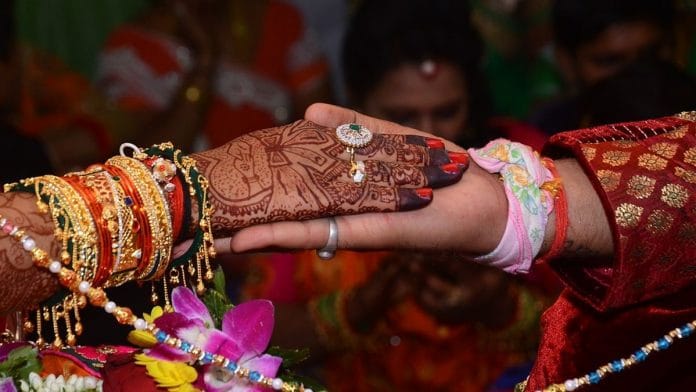
Thank you dear subscribers, we are overwhelmed with your response.
Your Turn is a unique section from ThePrint featuring points of view from its subscribers. If you are a subscriber, have a point of view, please send it to us. If not, do subscribe here: https://theprint.in/
Of late, i have been wondering how fragile is the institution of marriage that it could collapse if the husband can no longer have non-consensual sexual intercourse with his wife. Whilst the institution of marriage has come a long way in last 4350 years, it still has a long way to go. In India, a husband continues to think that he is entitled to have sexual intercourse with his wife, without her consent, and the society accepts it. Should we continue to accept marital rapes under the garb of upholding the institution of marriage?
The first recorded evidence of marriage ceremonies dates from about 2350 BCE (erstwhile BC) in Mesopotamia. Unlike today, where couples would like to marry for love, back then, marriage’s primary purpose was to bind women to men, and thus guarantee that a man’s children were truly his biological heirs. Through marriage, a woman became a man’s property. Marriages for most part of history were solemnised for practical purposes and not because of love. While the idea of romantic love in marriages is of recent origin, love before marriage is still unacceptable in most parts of India. In India majority of the marriages continue to be arranged. That could be a reason why most wives’ continue to be considered as property of their husbands’ and why most husbands do not think twice before violating the dignity of their wives. In most peoples’ eyes a husband cannot rape his wife because marriage automatically gives perpetual consent for sexual intercourse, hence there is no need for consent every time the husband wants to indulge in a sexual act.
In often quoted landmark judgment, R v R (1991) (United Kingdom), a husband defended the ‘conviction for attempted rape’ on the ground that marriage gave irrevocable consent, therefore a husband cannot rape his wife. The court refuting his contention stated that for a person to be penalised for rape the relationship between parties is immaterial. It was held that a husband could be convicted of rape or attempted rape of his wife where she withdrew her consent to sexual intercourse. By way of this judgement, the United Kingdom recognised marital rape as an offence, however we continue to hold on to the laws given by them.
The Verma Committee Report (2013), after the Nirbhaya case, had recommended many changes in the criminal laws pertaining to sexual assault against women. One of the recommendations was to remove the exception of marital rape. In line with the landmark judgement, R v. R, the report affirmed that marriage is not an irrevocable consent to sexual intercourse. Therefore, in order for an accused to be charged for rape, the relationship between him and the victim should be immaterial.
According to the World Health Organisation, Sexual violence is defined as: “any sexual act, attempt to obtain a sexual act, unwanted sexual comments or advances, or acts to traffic, or otherwise directed, against a person’s sexuality using coercion, by any person regardless of their relationship to the victim, in any setting, including but not limited to home and work.” However, marital rape is not recognised in many countries including India. It is heartening though that our next door neighbour Nepal is one of the countries that recognises marital rape as a criminal offence.
One could only imagine what a young woman who was never allowed to interact with men, forget having a sexual relationship, must go through when after the marriage (arranged) ceremony her husband gets unfettered rights over her body. Our society has conditioned women to give in to the sexual demands of their husbands, even if they feel violated. The husband could force himself even when the wife is unwell, tired, unwilling, menstruating etc. Whatever be the outcome of the marital rape case hearing in progress at the Delhi High Court, we as a society must not allow our women to be violated by their husbands under the garb of saving the institution of marriage. Every individual deserves to live with dignity irrespective of their gender or sexual orientation.
Forced sexual relationship is equally traumatising and harmful to the wife. The institution of marriage, for whatever it is worth, should not be solely dependent on the woman losing her agency and the man continuing to think he can sexually force himself on his wife to demonstrate his position of power. Lovemaking is best done with love, instead of feeling entitled and forcing themselves, husbands must learn to treat their wives as equals and true partners.
Also read: ‘Have 50 nations got it wrong?’ Delhi HC asks as it looks into IPC exception for marital rape
These pieces are being published as they have been received – they have not been edited/fact-checked by ThePrint.


COMMENTS